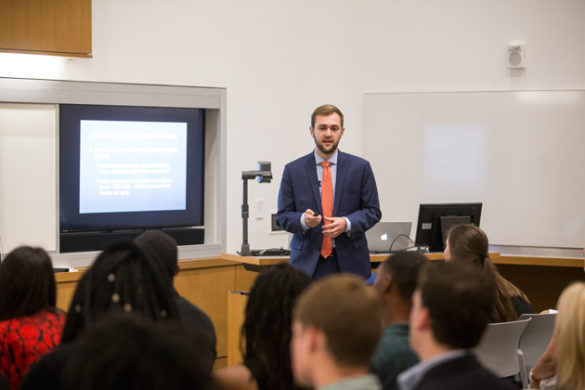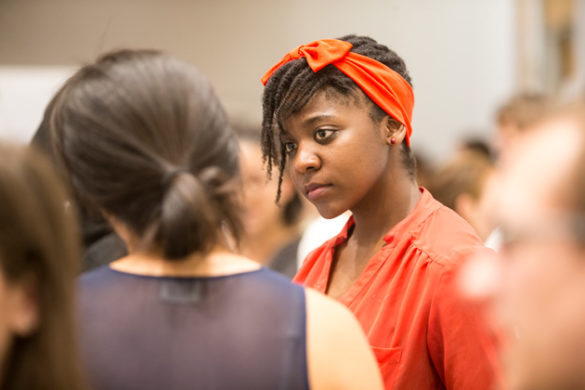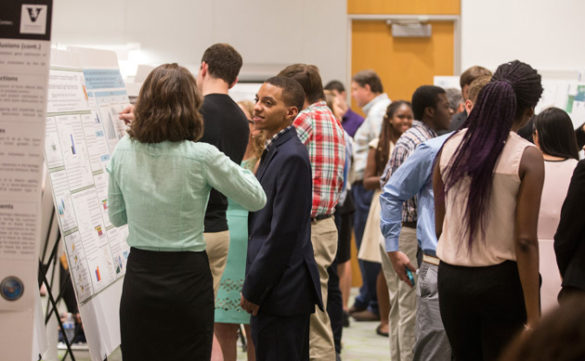
Students hosted by the elite Vanderbilt Summer Science Academy (VSSA) and the Vanderbilt Institute for Nanoscale Science and Engineering and Department of Physics and Astronomy Research Experience for Undergraduates (REU) programs presented their research—from stem cells to Zika—at the 15th annual Student Research Symposium held Aug. 3 at the Engineering and Science Building.
Established in 2003 by the School of Medicine’s Office of Biomedical Research Education and Training, VSSA hosts about 100 undergraduates each year from institutions around the country. The program, co-directed by Beth Bowman, assistant professor of medical education and administration, and Christina Keeton, program coordinator in the Office of Biomedical Research Education and Training, unites Vanderbilt’s various summer research opportunities and provides supplementary research seminars, enrichment activities and lectures, and social activities. The program’s goal is twofold: to build a community for undergraduates at Vanderbilt over the summer and to promote the university’s world-class research training environment to students on a national scale.
The Vanderbilt Institute for Nanoscale Science and Engineering (VINSE) has hosted a National Science Foundation-funded Research Experience for Undergraduates site program on campus since 2011. The VINSE REU, coordinated by Alisha McCord, Sarah Satterwhite and Clare McCabe, attracts undergraduates from across the country to Vanderbilt and also provides valuable supplementary enrichment and social activities to the participating students. In its seven years of operation, the VINSE REU has provided opportunities to 77 students who have gone on to win numerous national awards, including eight NSF graduate research fellowships and five Goldwater Scholarships.
The Research Experience for Undergraduates in Physics and Astronomy program is a 10-week internship for rising sophomores, juniors and seniors. The program provides the opportunity for students to work closely with faculty, postdocs and other students on research projects at the forefront of physics and astronomy.
Thursday’s symposium was the culmination of the students’ summer research experience of countless hours in labs across campus engaged in specialized research.
There are two major tracks within VSSA: the Basic Science Programs for undergraduates interested in careers in research, and the Undergraduate Clinical Research Internship Program for students who wish to pursue a career in medicine. Between these two tracks, there are more than a dozen funding mechanisms that bring students into VSSA, ranging from internal to regional to national funding sources. Additionally, VSSA welcomes students funded by their home labs. “Participation in the Summer Science Academy is a valuable learning experience that enhances a student’s research skills and makes him or her more competitive for acceptance into top medical or graduate programs,” Bowman said.
The VSSA summer program and symposium is possible thanks to the help of the dozens of laboratories and volunteers that train students and judge their presentations, according to Bowman.

Luwi Shamambo, originally from Zambia, is a rising junior majoring in Medicine, Health and Society at Vanderbilt, but this was her first experience in an actual research lab. Her summer project with Lauren Jackson, assistant professor of biological sciences, has involved molecular cloning, bacterial transformations and protein purifications—all necessary steps for protein isolation. Mutants of the protein she is attempting to isolate can lead to diseases such as spastic paraplegias, which have symptoms similar to cerebral palsy. She is hopeful that her work will contribute to more effective medical treatments.
Clemson senior Christin Anthony, working with Vivian Gama, assistant professor of cell and developmental biology, is engaged in stem cell research that could ultimately result in improved models for diseases and individualized medical therapies. Philip Stauffer, a senior studying biochemistry and microbiology at Virginia Tech, is laying the groundwork for a new project with Fred Guengerich, the Tadashi Inagami, Ph.D. Professor of Biochemistry. He is characterizing Zika RNA polymerase enzyme properties to help develop a reliable Zika vaccine.
Beyond participants’ impressive lab experiences, the goal of VSSA is to enable students to communicate their findings and science in general, Bowman said. In preparation for the symposium, VSSA organizes training sessions for students to learn the basics, such as “what makes a good poster, what is a scientific abstract, and how you should structure these things,” she said. Research talks throughout the summer help students understand at what level they should communicate their science.
“Each week all the students in the program meet in Light Hall for a nice sit-down lunch,” Shamambo said. “It’s a really great way for us to build our community and interact with people we don’t get to see very often. But what I love most about these meetings are the presentations.
“We’ve learned about bone tumor research, diabetes from a molecular standpoint, and even received valuable advice regarding applying to Ph.D. and M.D./Ph.D. programs,” she said.

Thursday’s symposium provided an opportunity for students to put into practice the skills they observed and developed over the summer. Approximately 120 students presented their research during two poster sessions.
The event also allowed students to celebrate the research and hard work of their peers. The support created through organized activities and common goals was “one of the best things about the program,” Anthony said. Students were encouraged to develop friendships and enjoy exploring all that Nashville has to offer.
Armed with improved research and communication skills, students will leave the academy well equipped for future projects and experiences. For many this means graduate school.
“VSSA has helped me determine what to do with my life,” said Mitchell Stokan, a VINSE REU participant and student at the University of Kentucky. “I am now considering graduate school, not something I had thought of before.”
For Stauffer, the summer experience made him feel like a true graduate student, and he said he found the VSSA experience “very exciting and immensely rewarding.” He is now considering a doctoral degree in biochemistry and structural biology at Vanderbilt.